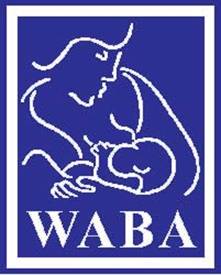Comment of the World Alliance for Breastfeeding Action to the UN Secretary General’s Sustainable Development Report
The World Alliance for Breastfeeding Action (WABA), its Core Partners and allies believe that breastfeeding promotes and protects the physical and emotional health and nutrition of baby and mother, preserves the environment, conserves financial resources, and makes the world a more secure place now and in the future. It is an essential component of any sustainable development goals and underpinned by several global documents such as the WHO/UNICEF Global Strategy for Infant and Young Child Feeding (2002) and the WHO Comprehensive Implementation Plan on Maternal, Infant and young child nutrition (2010).
As such, we advocate for the explicit inclusion of breastfeeding in paragraph 70 of the UN Secretary General’s Sustainable Development report. The explicit text we advocate for is included in red within paragraph 70:
70. The agenda must address universal health-care coverage, access and affordability; end preventable maternal, new-born and child deaths and malnutrition ensure the protection, promotion and support of exclusive breastfeeding for six months and continued breastfeeding with adequate complementary feeding for 2 years and beyond; ensure the availability of essential medicines; realize women’s reproductive health and rights; ensure immunization coverage; eradicate malaria and realize the vision of a future free of AIDS and tuberculosis; reduce the burden of non-communicable diseases, including mental illness, nervous system injuries and road accidents; and promote healthy behaviours, including those related to breastfeeding, water, sanitation and hygiene.
Although outside the scope of the UN Secretary General’s report, WABA calls for more specific attention to the following elements to ensure optimal breastfeeding/infant and young child feeding practices globally:
- Ensuring that “At least 50% Exclusive Breastfeeding (EBF) in the first 6 months” is included as a target indicator in the post 2015 agenda, and in relevant national policy on nutrition and health.
- Ensuring that all facilities or hospitals where babies are born should implement Baby-friendly best practice standards.
- Ensuring that all mothers have access to skilled breastfeeding counselling and support, both at health facility level and community level.
- Implementing maternity protection legislation with the ILO Maternity Protection Convention C183 as a minimum standard.
- Enacting Legal provisions that fully implement the International Code of Marketing of Breastmilk Substitutes and relevant World Health Assembly resolutions.
- Strengthening of national emergency preparedness policies and plans to include Infant Feeding in Emergencies (IFE) with regulation of donations and of untargeted distribution of breast-milk substitutes, and of ready-to-use foods (RUFs).
Amal Omer Salim, WABA Senior Techincal advisor: amalomersalim@hotmail.com
Jennifer Mourin, WABA Senior Consultant: jennifer.mourin@waba.org.my
